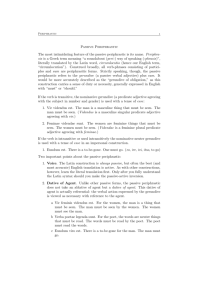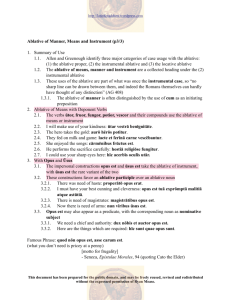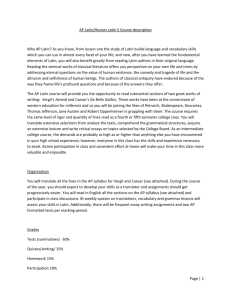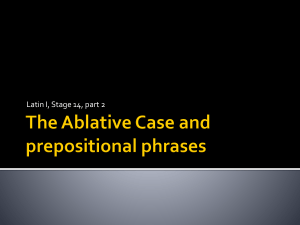Wheelock XXIV
advertisement
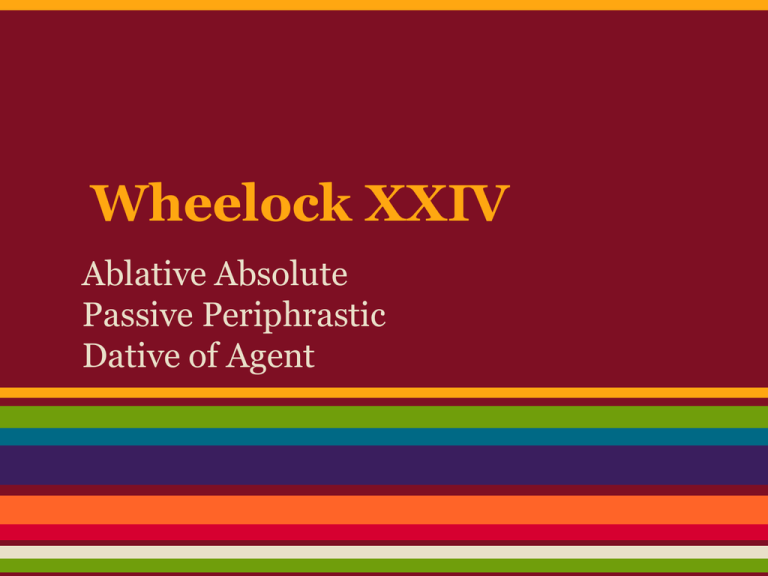
Wheelock XXIV Ablative Absolute Passive Periphrastic Dative of Agent Ablative Absolute Last chapter, we learned participles: Rōmam videntēs, virī gaudēbant. Now, the ablative absolute Rōmā vīsā, virī gaudēbant. (With) Rome having been seen, the men were rejoicing. Ablative Absolute Why is it called an ablative absolute? Ablative? Absolute? Translating: hīs rēbus audītīs... (With) these things having been heard...* When/Since/After/etc. these things had been heard... • • Ablative Absolute Sometimes, the ablative absolute contains other words: Eō imperium tenente, ēventum timeō. With him holding the power, I fear the outcome. Sometimes, the participial form of sum is deleted, leaving just a noun-noun or nounadjective combo. - Caesare duce, nihil timēbimus. - Caesare incertō, bellum timēbāmus. Passive Periphrastic Name: - Passive because it uses the passive voice (in fact, it uses the gerundive) - Periphrastic because it's more than one word GERUNDIVE + SUM Note: gerundive agrees with the subject (of sum) in gender, number, and case Passive Periphrastic A passive periphrastic conveys the idea of necessary and obligatory action. Hence, id faciendum est is not merely this is about to be done but rather this must be done Translating: Puella amanda est. = The girl is to be loved. = The girl must be loved.* = The girl has to be loved.* Puella amanda erat.= The girl had to be loved. Dative of Agent Instead of ablative of agent, the dative of agent is used with the passive periphrastic construction. Literal translations would be super awkward... like more awkward than saying good-bye to someone and then walking the same way. Therefore, translate like it's ablative even though it's dative. Hic liber mihi legendus est. This book must be read by me. Practice 1. Explain the term "absolute." 2. What participle is used in a passive periphrastic? What two-letter combination can be used to identify it? 3. What does the passive periphrastic indicate? 4. Urbe captā, Caesar gentēs dēlēvit. 5. Illa fēmina omnibus laudanda est. 6. Pāx ducibus nostrīs petenda erat. Translate. Identify constructions. 1. Carthāgō dēlenda est. 2. Asiā victā, dux Rōmānus fēlīx multōs servōs in Italiam mīsit. 3. Quidquid dīcendum est, līberē dīcam. līberē = adverb 4. Haec omnia vulnera tibi nunc sānanda sunt. - sānāre = to heal 5. Nec tumultum nec mortem violentam timēbō, Augustō terrās tenente. 6. Tarquiniō expulsō, nōmen rēgis audīre nōn poterat populus Rōmānus. Dē Cupiditāte Homō stultus, "Ō cīvēs, cīvēs," inquit, "pecūnia ante omnia quarenda est; virtūs et probitās post pecūniam." Pecūniae autem cupiditās fugienda est. Fugienda etiam est cupitās glōriae; ēripit enim lībertatem. Caelō receptus propter virtūtem, Herculēs multōs deōs salūtāvit; sed Plūtō veniente, quī Fortūnae est fīlius, āvertit oculōs. Tum, causā quaesītā, "Ōdī," inquit, "illum, quod malīs amīcus est atque omnia corrumpit lucrī causā." salūtāre, to greet---Plutus, -ī, god of wealth corrumpō, -ere, to corrupt---lucrum, -ī, gain/profit The Satirist Chapter XXIV Vocabulary Quiz A 1. imperium, -iī 2. servus, -ī 3. fabula, -ae 4. recipio, recipere B 5. excipio, excipere 6. accipio, accipere 7. quaero, quaerere 8. solacium, -iī 9. Someone invulnerable is not able to be ________. 10. If you were to deride J-Biebs, you would _______ down at him. Chapter XXIV Grammar Quiz Translate and identify the underlined construction. Puella amanda est. Romā visā, virī gaudēbant. Caesar, urbe captā, gentēs dēlēvit. Pāx ducibus nostrīs petenda erat. Carthāgō dēlenda est. Quidquid dīcendum est, līberē dīcam. Pecūniae autem cupiditās fugienda est. Imperiō acceptō, dux patriam recēpit. 1. 2. 3. 4. 5. 6. 7. 8.
